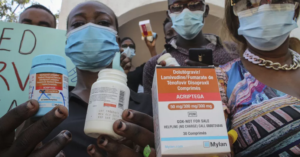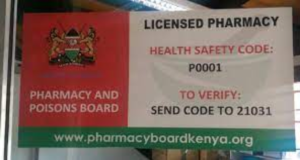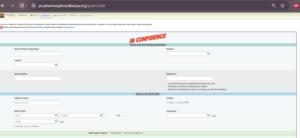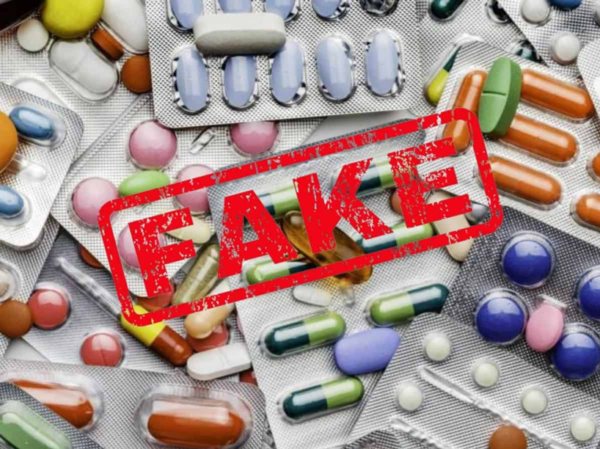Source: Siasat Daily
Most of us make countless trips to our local Pharmacy to buy some painkillers for a throbbing headache, a cough syrup for our ailing child, to fill a prescription for an antibiotic, or even to get a prescription refill for those with chronic illnesses, just to mention a few. Now imagine if the medicine you purchased did not contain the active ingredient essential for treating, curing, or preventing a disease. Such medicines would prove ineffective for the target illness. Even worse, imagine if that medicine contained toxic components that could harm your body. This would undoubtedly pose serious health consequences to you, including death.
The World Health Organization (WHO) describes counterfeit medicines as products posing as legitimate medications by deliberately falsifying their identity, composition, or source. Counterfeit medicines pose a significant health risk as they may contain no active ingredients, wrong amounts of the active ingredient, or may contain harmful and undesirable substances. WHO further reports that antibiotics, antimalarials, analgesics and emergency contraceptive pills are the most likely to be counterfeited. Counterfeit emergency contraceptive pills, for instance, would most likely lead to unintended pregnancies. Substandard and falsified antibiotics, on the other hand, would contribute significantly towards antimicrobial resistance and drug-resistant infections. This is the grave danger associated with counterfeit or falsified medicines.
The global trade in counterfeit medicines has become a major public health crisis, fueled by the rapid increase in globalisation over the past two decades. A WHO report states that 10% of all medications sold worldwide are falsified or substandard. The problem of counterfeit drugs has especially been rampant in Low and Middle-Income Countries (LMICs) across Asian and African continents, where fake drugs thrive due to faulty supply chains, inadequate regulatory frameworks, poverty, and insufficient law enforcement measures. The proliferation of unlicensed pharmacies, clinics, and hospitals exacerbates this situation by promoting the trade in illegal pharmaceuticals, thus highlighting the need for stricter regulations.
In Kenya, two bodies ensure that all the medicines consumed in the country are safe, efficacious and of good quality. These are the National Quality Control Laboratory (NQCL), which inspects drug samples, and the Pharmacy and Poisons Board (PPB), Kenya’s national drug authority. In 2018, these two entities conducted a survey showing that about 12 % of Kenyan medicines are counterfeit. The Kenya Association of Pharmaceutical Industry (KAPI) and other vital players put this number at 30%, raising great concern about the safety of the drugs used in the country. Just recently, in late 2023, PPB warned of falsified batches of the HIV drug Truvada circulating illegally within the country. These reports show just how much counterfeit medications can hamper public health efforts, such as those geared towards HIV eradication.

Source: Africa News
The rise of counterfeit medicines has been alarming. How can we then identify counterfeit medication?Some counterfeit medicines are often designed to look identical to genuine medicine, making them extremely hard to spot. However, many fake drugs leave clues behind:
- Packaging. Look for damage, spelling mistakes, incorrect or missing labels, and lost or mismatched manufacturing or expiry dates. The packaging could also be of poor quality. See any tampered seals? Check with your Pharmacist!
- Appearance: Check the medicine or pills for discolouration, degradation, or strange smells and tastes. The pills could also have different sizes and shapes than usual. Cracked or mouldy pills should be considered suspicious.
Additionally, if you suspect that the medicine is not working or that you have suffered a severe side effect, immediately seek professional help from your pharmacist or doctor, as it could be a counterfeit medicine.
You should make all purchases at registered and licensed pharmacies to avoid being given counterfeit medicines. In Kenya, all registered chemists have a unique health safety code displayed within their premises (See Image below) that can be sent via SMS to 21031 to verify the registration of the Pharmacy outlet.

Image: Pharmacy and Posions Board Safety Code Notice
More importantly, you should report any medicine you have identified or suspected to be counterfeit. To do this, you can visit the mobile Pharmacovigilance Electronic Reporting System (mPvERS), a mobile-based solution by the PPB that provides a reporting platform of adverse reactions and suspected poor-quality health products and technologies by the public and healthcare professionals. The platform is straightforward and user-friendly. You will only be required to feed in your personal details, followed by details of the medicine and the adverse effects. Click here to access the platform. The platform also provides the option of using the USSD code *271# to file reports of counterfeit drugs or poor-quality medication. Here is a step-by-step tutorial showing how one can utilise the USSD option.

Image showing the mPvERs Interface
The report submitted will help to inform measures that aim to strengthen vigilance and improve the quality of health products in Kenya. It helps PPB and NQCL conduct thorough investigations, recall all medicines deemed to be counterfeit, and issue an alert to the rest of the public. More importantly, reporting helps to prepare for fast response in case of health emergencies due to the harmful effects of counterfeit medicine. Taking the initiative to report counterfeit drugs greatly contributes to a more precise understanding of the scope, scale, and detrimental effects of substandard and falsified medical products while simultaneously pinpointing vulnerabilities, weaknesses, and emerging trends.
The battle against illegal trade in illegal pharmaceuticals may seem a herculean task, but it is crucial to ensure the safety of consumers. It demands immediate action from regulatory bodies, healthcare professionals, and the public to combat the counterfeit drug trade and protect human health. Let us all be proactive by reporting any identified counterfeit medicines.
References:
- https://www.who.int/news-room/fact-sheets/detail/substandard-and-falsified-medical-products
- https://web.pharmacyboardkenya.org/talking-points-by-chief-executive-officer-mobile-pharmacovigilance-electronic-reporting-system-mpvers-version-launch-on-13th-april-2022/
- https://apnews.com/article/kenya-us-hiv-counterfeit-medication-6420b710aa4f0e72f449410077e8103b
Written by:
Dr. Kelvin N. Waweru,
Pharmacist, Youth Health Advocate.
LinkedIn: https://www.linkedin.com/in/kelvin-waweru-388448188/
